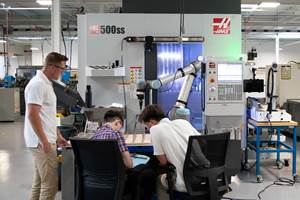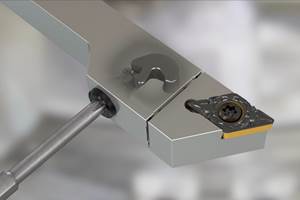Production Machine Shop Proves Its Value
Racks of unfinished parts ... half the machines in setup ... an in-process inventory that could choke a horse. This shop was also outsourcing more than half of its parts. Management presented the manager with a challenge - either make the machine shop economically viable or liquidate it.
Share




"Racks of unfinished parts . . . half the machines in setup . . . an in-process inventory that could choke a horse."
This scene greeted Wayne Wentworth his first day as machine shop manager at Thermo IEC (Needham Heights, Massachusetts) in 1997. The shop was also outsourcing more than half of its parts. Management presented Mr. Wentworth with a challenge—either make the machine shop economically viable or liquidate it.
This 100-year-old company manufactures high precision floor and tabletop centrifuges. "There's nothing difficult about the materials we cut," says Mr. Wentworth. "They're basically aluminum, polypropylene plastic and a variety of cast metals.
"Even our tolerances aren't particularly demanding. What's critical is the part's weight distribution. It has to be perfectly balanced—when you're centrifuging at speeds up to 30,000 rpm and generating forces up to 50,000g, an out-of-balance part makes a lot of noise and burns through a lot of bearings."
When Mr. Wentworth joined Thermo IEC, the shop's machines were operating at a satisfactory level of efficiency, but each had its own operator. This led to high costs and low productivity.
High in-process inventories were the result of other factors. Production schedules were interrupted by emergency calls for out-of-stock parts. This meant half-finished pieces were removed from the machines and placed in in-process inventory. Downtime increased as additional setups were needed for emergency runs.
"If a part needed to be drilled and then bored, they would first drill all the parts and then later bore them," Mr. Wentworth explains. "This required two setups rather than one, extending production time and adding to in-process inventory."
The machine tools also lacked versatility. "A lot of our parts require both turning and milling or face- and back-turning," says Mr. Wentworth. "With the equipment we had, this meant multiple chuckings, or setting up two or more machines to produce a single part."
Thermo IEC first addressed the high costs of one-person/one-machine. "We operate in a spacious 110,000 square foot building, more than half of which is occupied by parts manufacturing, assembly and packaging," Mr. Wentworth says. Following a part analysis, the machines were repositioned into cells, allowing a maximum range of parts to be produced in a minimum amount of space.
Operators were then able to attend to multiple machines. Using manufacturing cells resulted in a 20 percent reduction in personnel with no increase in overtime.
Next, setup times were shortened. Placing the machines closer to each other, and each cell closer to the tool room, had a modest effect. Tools were sorted into job boxes; each box contained all tooling and fixtures needed for a particular part. Finally, sub-plates and fixture-plates were created for all milled parts, with the coordinates machined into each plate for ready reference.
Third, the production group opened a closer liaison with sales and marketing in order to obtain frequent reports of sales trends and revised sales forecasts. With these, more efficient and responsive production schedules were created and emergency interruptions could be eliminated.
Finally, Mr. Wentworth evaluated various brands of machine tools and decided on Daewoo (West Caldwell, New Jersey). A close relative working at a nearby technical institute sold Thermo IEC an 18-year-old Daewoo Puma 10 CNC turning center at a favorable price.
Two Daewoo turning centers, the used Puma 10 and a new Puma 250MS, arrived on the same day in 1999. Keith Winstanley, Thermo IEC's manufacturing engineer, describes the first day of operation. "We were machining aluminum bases," he says. "We fired up the Puma 10, and the first piece came out well within tolerance. In fact, we ran the entire run without a single piece out of spec." That was 3 years ago, and the company continues to run the Puma 10 almost daily with similar results.
The Puma 250MS brought a new level of efficiency to Thermo IEC's machine shop. "The machine accepts bar stock up to 3 inches in diameter," Mr. Winstanley explains, "and its 30 hp spindle motor lets it take deep cuts at high feeds. Our cycle times became a lot shorter."
The Puma 250MS is equipped with a sub-spindle and accepts live tooling. The shop became able to produce complex parts on one machine with a single setup—parts that previously required multiple chuckings and the involvement of two or more machines.
Another advantage cited is quicker setups. The automatic tool setter eliminates the need for skim cuts and measurements, and it automatically enters the tool offsets in the machine's controller, eliminating the risk of data entry errors.
Working a single shift and calculating the savings through increased in-sourcing, payback for the Puma 250MS was less than 2 years.
In October 2000, Thermo IEC purchased a Daewoo DMH-400 horizontal machining center to augment the existing Hitachi Seiki HC500. "We had begun in-sourcing a lot more parts and needed the extra capacity," Mr. Winstanley says. "The DMH-400 gave us 30 hp at the spindle, letting us cut deeper and faster. We also liked the 60-tool ATC, through-the-spindle coolant and its rigid tapping feature. The controller's multi-block look-ahead function was also a time saver. All told, it added a lot to our capacity and has proven to be our biggest contributor to lower shop costs."
As an added benefit, both the Daewoo turning centers and the Daewoo machining centers use Fanuc controls. Operators move from one machine to another without having to learn different controls and operating systems.
A Puma 400M is the most recent addition to Thermo IEC's shop floor. Arriving in December 2001, this 19,500-pound, 50 hp turning center with live tooling made a greater contribution to savings in its first months of operation than did the Puma 250. Complete payback is expected in about 18 months.
New equipment and streamlining efforts have resulted in measurable benefits. Since the program's inception, the amount of outsourced products has been cut in half. Productivity, which the company computes as a relationship between time worked and machine utilization, has increased from 76.7 percent to 101.1 percent. Headcount in the machine shop remains 20 percent below the 1998 level.
Most important, during this period, with product sales growing only slightly, corporate profits have grown more than 160 percent. Much of this is attributed to the proven viability of Thermo IEC's in-house machine shop.
Related Content
CNC Machine Shop Honored for Automation, Machine Monitoring
From cobots to machine monitoring, this Top Shop honoree shows that machining technology is about more than the machine tool.
Read MoreIndustry Analysis: Machining Semiconductor Components
With many machine shops anticipating long-term growth in demand from the semiconductor industry, it is worth the time to heed the advice of manufacturers who have already been servicing this end-market for years.
Read MoreFinding the Right Tools for a Turning Shop
Xcelicut is a startup shop that has grown thanks to the right machines, cutting tools, grants and other resources.
Read MoreQuick-Change Tool Heads Reduce Setup on Swiss-Type Turning Centers
This new quick-change tooling system enables shops to get more production from their Swiss turning centers through reduced tool setup time and matches the performance of a solid tool.
Read MoreRead Next
5 Rules of Thumb for Buying CNC Machine Tools
Use these tips to carefully plan your machine tool purchases and to avoid regretting your decision later.
Read MoreRegistration Now Open for the Precision Machining Technology Show (PMTS) 2025
The precision machining industry’s premier event returns to Cleveland, OH, April 1-3.
Read MoreBuilding Out a Foundation for Student Machinists
Autodesk and Haas have teamed up to produce an introductory course for students that covers the basics of CAD, CAM and CNC while providing them with a portfolio part.
Read More






































